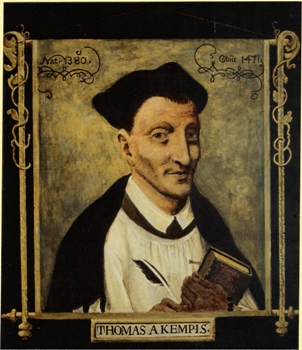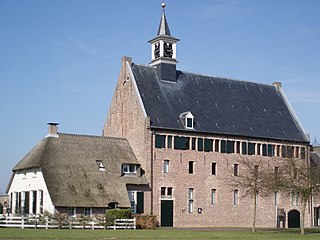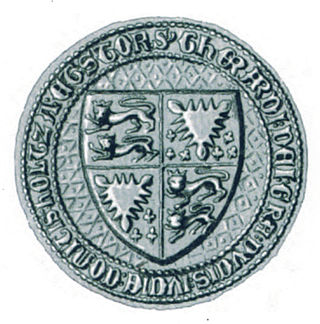Related Research Articles

Thomas à Kempis, CRV was a German-Dutch canon regular of the late medieval period and the author of The Imitation of Christ, published anonymously in Latin in the Netherlands c. 1418–1427, one of the most popular and best known Christian devotional books. His name means "Thomas of Kempen", Kempen being his home town.

Zutphen is a city and municipality located in the province of Gelderland, Netherlands. It lies some 30 km northeast of Arnhem, on the eastern bank of the river IJssel at the point where it is joined by the Berkel. First mentioned in the 11th century, the place-name appears to mean "south fen". In 2005, the municipality of Zutphen was merged with the municipality of Warnsveld, retaining its name. In 2021, the municipality had a population of 48,111.

Gerardus Mercator was a Flemish geographer, cosmographer and cartographer. He is most renowned for creating the 1569 world map based on a new projection which represented sailing courses of constant bearing as straight lines—an innovation that is still employed in nautical charts.

Deventer is a city and municipality in the Salland historical region of the province of Overijssel, Netherlands. In 2020, Deventer had a population of 100,913. The city is largely situated on the east bank of the river IJssel, but it also has a small part of its territory on the west bank. In 2005 the municipality of Bathmen was merged with Deventer as part of a national effort to reduce bureaucracy in the country .

Gerard Groote, otherwise Gerrit or Gerhard Groet, in Latin Gerardus Magnus, was a Dutch Catholic deacon, who was a popular preacher and the founder of the Brethren of the Common Life. He was a key figure in the Devotio Moderna movement.

Gerrit Janszoon Vos, often known by his Latin name Gerardus Vossius, was a Dutch classical scholar and theologian.
The Brethren of the Common Life was a Roman Catholic pietist religious community founded in the Netherlands in the 14th century by Gerard Groote, formerly a successful and worldly educator who had had a religious experience and preached a life of simple devotion to Jesus Christ. They believed that Christianity should be practiced not only in formal religious settings, but also in everyday life, and they sought to promote a practical spirituality that emphasized personal piety and devotion.
JohannesBusch was a major reformer and provost of a community of Canons Regular. He was associated with the Brethren of the Common Life.
Devotio Moderna was a movement for religious reform, calling for apostolic renewal through the rediscovery of genuine pious practices such as humility, obedience, simplicity of life, and integration into the community. It began in the late 14th century, largely through the work of Gerard Groote, and flourished in the Low Countries and Germany in the 15th century, but came to an end with the Protestant Reformation. It is most known today through its influence on Thomas à Kempis, the author of The Imitation of Christ, a book which has proved highly influential for centuries.
Canons regular are priests who live in community under a rule and are generally organised into religious orders, differing from both secular canons and other forms of religious life, such as clerics regular, designated by a partly similar terminology.

Gabriel Biel was a German scholastic philosopher and member of the Canons Regular of the Congregation of Windesheim, who were the clerical counterpart to the Brethren of the Common Life.
Floris Radewyns was the co-founder of the Brethren of the Common Life.
Heinrich von Ahaus (1371–1439) was the founder of the Brethren of the Common Life in Germany.

The Congregation of Windesheim is a congregation of Augustinian canons regular. It takes its name from its most important monastery, which was located at Windesheim, about four miles south of Zwolle on the IJssel, in the Netherlands.
Gerlac Peterssen was a Dutch mystic.
Henry of Kalkar, otherwise Heinrich Egerof Kalkar, was a Carthusian theological writer.

Gerardus Geldenhouwer was a Dutch historian and Protestant reformer.

Gerhard VI was the Count of Holstein-Rendsburg from 1382, and Duke of Schleswig as of 1386.
Gerardus is a Latinized version of the Germanic name Gerard. It has been in use as a birth name in the Low Countries. In daily life, most people use a shorter version, such as Geert, Ger, Gerard, Gerd, Gerhard, Gerrie, Gerrit, Gert, and Geurt. Among people with this name are:
Hendrik Mande was a Dutch mystical writer, an early member of the Brethren of the Common Life, and an Augustinian Canon.